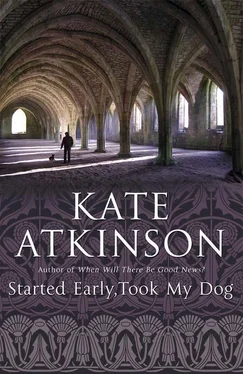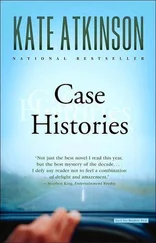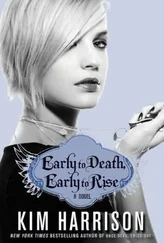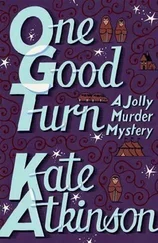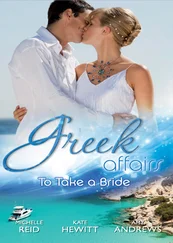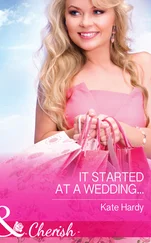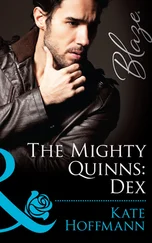The burnt orange had been a particularly unfortunate choice for Amy’s friend Chloe Pallister with her mousy hair and tallow complexion. ‘Mother of the bridesmaid, never mother of the bride,’ Linda Pallister said, sidling up to Tracy, smiling hopefully. She didn’t have anyone else to talk to. Linda Pallister’s own wedding clothes, a black velvet T-shirt and a skirt that seemed to have been made out of tiedyed cobwebs, couldn’t have been more out of place. Linda was also sporting a large assortment of silver rings and bracelets as well as an enormous crucifix on a leather shoestring. The crucifix looked more like penance than religion. Linda had become a Christian in the eighties, an unfashionable decade for evangelism, although Linda had gone, uncharacteristically, for straight-down-the-middle C of E. No sign at the wedding of Linda’s eldest, Jacob. Tracy had heard a rumour that he was a bank manager.
‘Your Chloe looks lovely,’ Tracy lied.
If Tracy phoned Linda Pallister and started asking about Kelly Cross’s kids she’d be flagging herself up, wouldn’t she? What, one of Kelly Cross’s children missing? Why only the other day Tracy Waterhouse was asking me to count them! Tracy had nicked a kid. Didn’t matter how much you paid, didn’t matter how much you dressed it up with righteousness, it didn’t make it legal.
She took the kid for lunch in Bella Italia. Kid worked her way through her own weight in penne and Tracy nibbled on some garlic bread. She had lost her appetite. The kidnapper diet. Tracy had done them all in her time – grapefruit, F-Plan, cabbage, Atkins. Selfinflicted torture. She’d been a big baby, a big child, a big teenager, it seemed unlikely that she would suddenly become a small, postmenopausal woman.
In Gap, Tracy bought clothes for Courtney, holding them up against her to gauge their fit, rather than going by the labels which didn’t seem to relate to the kid’s actual size. ‘How old are you, Courtney?’
‘Four,’ Courtney said, more of a question than an answer. She fitted the ‘2-3 year’ clothes easily. ‘You’re small for your age,’ Tracy said.
‘You’re big,’ Courtney said.
‘Can’t argue with that,’ Tracy said. Unsure of the rules of engagement with a small child, Tracy had decided it worked best if they both pretended they were grown-up and conversed accordingly.
She bought more clothes for Courtney than she had intended, but they were so nice and pretty, the kind of clothes Tracy never had when she was a little girl. Half a century ago her mother had dressed her in limp pinafore dresses and nylon jumpers with brown lace-up Clarks shoes, a look which even a cute kid, let alone Tracy, would have had trouble pulling off. Her parents had been over forty when Tracy was born, already old before their time. ‘We’d given up,’ her mother said, as if it had been a relief to do so. ‘And then you came along.’
Her parents had been too much at war with each other to bother with their child. They had battled passively, locked together in silent hostility while Tracy lived in the solitary confinement of the only child. Tracy thought of herself as a war baby even though the war was long over when she was born.
Courtney wiped her ever-present trail of snot on the sleeve of her grubby pink top. Tracy would have to buy tissues, tissues were the kind of thing that people who looked after kids carried in their bags at all times. There must be a caravan of kid-related supplies that she needed but Tracy had no idea what they might be. It would be helpful if kids came with instructions and a list of requirements.
Tracy ’s final purchase for Courtney was a red duffel coat in the sale, a garment that a younger Tracy, dreary in brown gabardine, had always coveted. The duffle coat had a soft plaid lining and real wooden toggles. It was an article of clothing that said someone cared. If it hadn’t been so warm in the shop she would have suggested the kid wear it straight away but Tracy could feel the sweat trickling uncomfortably down her back and the kid looked positively overcooked.
Tracy was flagging. She had read somewhere that shops and museums were the most tiring places for people. The kid looked dog-weary. ‘Do you want a carry?’ Tracy said.
Her knees almost buckled under the weight. Who knew a tiny kid could be so heavy? She had the gravity of a small, dense planet. Tracy staggered back to Mamas and Papas with Courtney in her arms and retrieved the car seat and fixed it in the Audi. She’d had the kid less than three hours and she felt mangled by exhaustion, no wonder the parents she saw in the Merrion Centre walked around like zombies.
She helped Courtney into the car seat, was surprised when the kid strapped herself in. Should they be able to do that? If you could fasten a buckle it meant you could unfasten one as well. ‘Don’t undo that,’ she advised the kid. ‘There are a lot of bad drivers on the road.’ The kid murmured a kind of assent. Her eyelids were blue with tiredness and she had the stunned look that Tracy had seen on abused kids. You had to wonder. It would hardly be a surprise, more likely than not, in fact. The things people did to kids could make your brain hurt. Hot needle, et cetera. Or maybe, like Tracy, the kid was just worn out with the turn the day had taken. It was four o’clock in the afternoon but time had become elastic, stretching out the day to infinity.
She glanced in the rear-view mirror and saw that Courtney was already asleep, making little buzzing sounds, like a large bee.

Jackson wondered what a dog might need. Food and a bowl to eat it out of, he supposed. He found both in a shop called Paws for Thought. He sensed he was entering deep into unknown territory. He had a new role. He knew who he was, he was a dog owner. He found it hard enough coping with having a son, the dog felt like even more of a stretch.
‘Lovely Border terrier you’ve got yourself there,’ the woman behind the counter said.
‘Is it?’ Jackson said, studying the dog. He had assumed it was some kind of mongrel, not a breed. It certainly looked like a mongrel, and not a particularly prepossessing one either. There were traces of blood on the dog’s snout and on his fur and the woman said, ‘Oh dear, has he been in a fight?’
‘Sort of,’ Jackson said.
The woman gave the rope around the dog’s neck a disapproving glance and said, ‘What’s the poor little chap’s name?’
Jackson ran through a mental list of names that might be more suitable than the one the dog already had and came up with nothing, apart from Jess, but that name was owned for ever by the Atwells’ sheepdog.
‘The Ambassador,’ he finally owned up. ‘He’s called The Ambassador.’ The dog’s ears perked up attentively. Jackson wondered where the dog had got its name from. He tried to imagine its big, ugly owner – ex-owner – shouting ‘Ambassador!’ into the depths of a field. In Roundhay it had been a torrent of expletives that had flowed from Colin’s mouth. He supposed it was a joke, imagined someone saying, ‘The Ambassador needs brushing’ or ‘The Ambassador’s asleep in his basket.’
The pet-shop woman raised sceptical eyebrows and said, ‘The Ambassador? I would have thought that was a name for a bigger dog.’
‘He’s big inside,’ Jackson said defensively.
The woman swept her hand around the shop and said, ‘Anything else? How about a coat? For the dog,’ she added when Jackson looked at her blankly. It seemed to Jackson that nature had given the dog a perfectly good coat so he said no but bought a leather lead and left before he got carried away by, say, the small four-legged sailor uniform that was hanging behind the counter, complete with jaunty little hat.
Читать дальше
